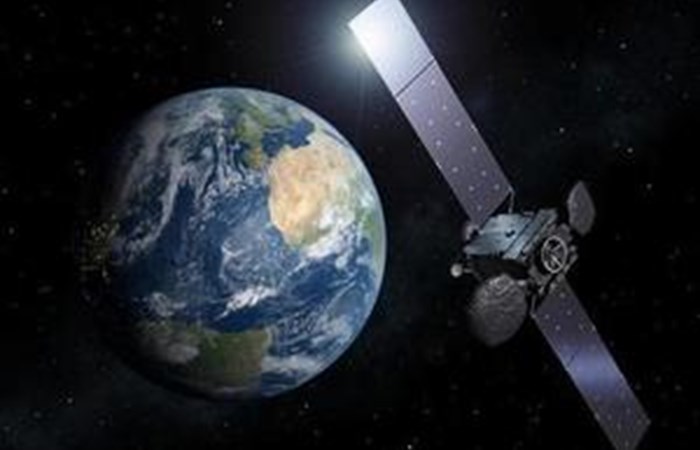govt

Todays announcement by UK Government ministers Lord Henley and Lord Duncan, gives the green light to missions designed to showcase the technology and put UK companies into orbit faster and at a lower cost. The UK is the largest funder of the European Space Agencys Advanced Research in Telecommunications Satellites (ARTES) programme, which transforms research into successful commercial projects.
The funding from the UK Space Agency was announced by Lord Henley, Parliamentary Under-Secretary of State at the Department for Business, Energy and Industrial Strategy, on a visit to the satellite powered data companys UK base in Glasgow, where Spire intends to create new jobs to add to its existing workforce.
Business Minister, the Rt. Hon. Lord Henley, said:
Thanks to this new funding, Spire will be able to cement its activities in the UK, develop new technologies and use space data to provide new services to consumers that will allow businesses to access space quicker and at a lower cost offering an exciting opportunity for the UK to thrive in the commercial space age.
Through the governments Industrial Strategy, we are encouraging other high-tech British businesses to pursue more commercial opportunities with the aim of growing the UKs share of the global space market to 10% by 2030.
UK Government Minister for Scotland Lord Duncan said:
Spire Global is at the cutting edge of technology, using satellite data to track ships, planes and weather in some of the worlds most remote regions. Theyre also an important employer in Glasgow, investing in the area and recognising the talent of Scotlands world class engineers and scientists. We know that the space industry is important to Scotlands economy and this UK Government funding will help companies like Spire stay at the forefront of this field.
The ARTES Pioneer programme is designed to support industry by funding the demonstration of advanced technologies, systems, services and applications in a representative space environment. Part of this is to support one or more Space Mission Providers, which could provide commercial services to private companies or public bodies.
Spires infrastructure, capabilities, and competencies all support our submission to this program. For the launch of our 50+ satellite constellation, we quickly became our own best customer, said Theresa Condor, Spires EVP of Corporate Development. Were looking forward to demonstrating our end-to-end service and infrastructure on this series of validation missions. Space as a Service means going from mission technical architecture to customer data/service verification, along with the ongoing development of critical enabling technologies.
One validation mission will develop parallel super-computing in space a core component for future computationally intensive missions. A second, exploitation of Global Navigation Satellite System (GNSS) for weather applications, will leverage Galileo signals for GNSS Radio Occultation. Radio occultation is a key data input for the improvement of weather forecasts. Upon completion, the GNSS-RO technology can be immediately commercialized.
The UK Space Agency is also supporting a space incubation centre in Glasgow and has provided support over several years to the Scottish Centre of Excellence in Satellite Applications, based at the University of Strathclyde and working across the whole of Scotland. The Centres role is to raise awareness of the potential of satellite services and data to be used in new and improved products and services in other space enabled markets including, for example, offshore renewable energy and aquaculture.
Examples of other ARTES funded projects include
| Company | Project |
|---|---|
| Cobham Technical Services | 1.5 million funding for MIDAS. This is a demonstration project to provide a range of tools that support the clearance of Land Mine and Improvised Explosive Devices (IED). This includes the use of Earth Observation and Satnav services to support the training of operators, planning clearance campaigns, real time monitoring of clearance in progress, through to post operation analysis and reporting. |
| Rezatec | 720,000 funding for Map, Measure, Monitor Information (M3I). This is a demonstration project following on from Rezatecs successful Peat Spotter feasibility study to deliver intelligence about areas of interest using Earth Observation, Satnav, and Satcom. The scope for M3I was increased from Peat Spotter to include additional land based assets including water, forestry, conservation and agribusiness sectors. |
| Beinn Bike | 130,000 funding for Mountain Bike Route Planning. This is a mobile app that uses Satnav to provide tailored mountain biking routes based on the users desired requirements. This project has just completed the feasibility study phase and is moving into the demonstration phase. Beinn Bike are based in Scotland. |
| Avanti | 439,000 funding for iFishSat. This is a feasibility study to investigate commercialisation of seafood while still at sea, directly from the fishing vessels using Earth Observation, Satnav, and Satcom services, as well as improving the trace
Related ArticlesCommentsWrite a CommentMinisterial Departmental News
News CalendarRecent CommentsFollow Us on TwitterTweets by @gov_wire |
